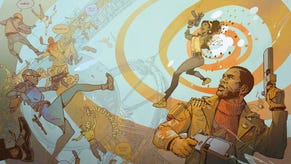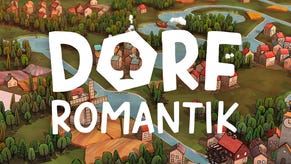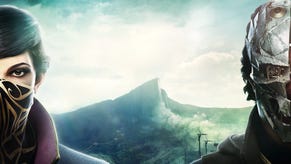Dishonored
Betraying convention.
Dunwall is also in the grip of a plague, spread by the swarms of rats that clog the streets. They approach the player or dead bodies and feast on them in daylight, munching loudly amidst the scarlet haze of disintegrating flesh. The local government is using the plague as a good excuse to harvest and purge whatever takes their fancy. Everything's in some way corrupt.
As well as the central objective, you can also explore the world around you to try to find hard evidence of the lawyer's corruption, or other tools that you can benefit from – like blueprints that allow you to hack the Walls of Light so they let you through but aren't so kind to pursuing guards.
Every significant action you perform has a potential ripple effect on events later on – especially negative actions like killing civilians or guards, which feed into the game's Chaos system.
The more of this chaos you set in motion over time, the more your options change. A character who discourages your violence may choose not to support you – or even betray you – further down the line if you ignore his advice, for instance. Or areas of the world may be more hostile to your presence.
You can always choose not to kill. Dishonored – as perhaps befits a game designed by the men who made Deus Ex and Arx Fatalis – is an assassin game where you don't have to assassinate anyone. Silence, shadow, occlusion and distance protect you from discovery as you stalk side streets and rooftops, and by exploring all your options you can even find ways to eliminate your target without actually killing them.
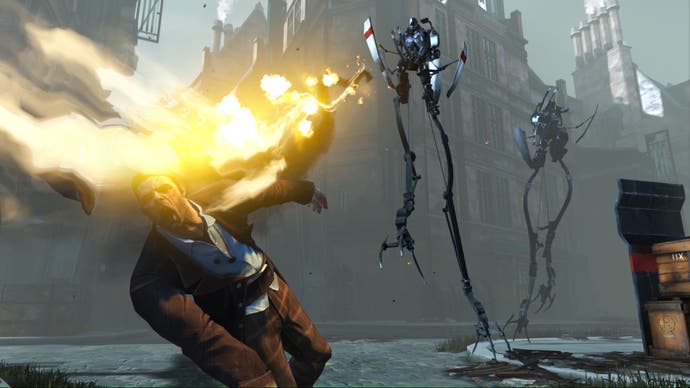
The developers estimate only one per cent of players will want to take this path, but they evidently care about that one per cent, allowing them to save anywhere – even on console – so they can try to preserve that invisibility by recalling earlier states.
Arkane clearly wants you to experiment, too, allowing for partial failure all over the place. In our demo, Corvo sneaks into the lawyer's home and makes it to his office – lurking in shadows, peering through keyholes and waiting for guards to pause in front of paintings or warm their hands by fireplaces to sneak past on the way – and eventually confronts and kills him in a blaze of magical abilities. But if you do alert the lawyer, you can continue – he'll cower somewhere, or run away, and that will change the way the mission unfolds but won't stop you from succeeding in it.
Games like Dishonored often have a sort of purity problem here, where being discovered feels like a shoddier outcome, and it remains to be seen how that will pan out, but there seems to be enough interesting content around every corner to distract you from that notion, like a final battle with Tall Boys – tough, shielded enemies on stilts who fire rockets at you.
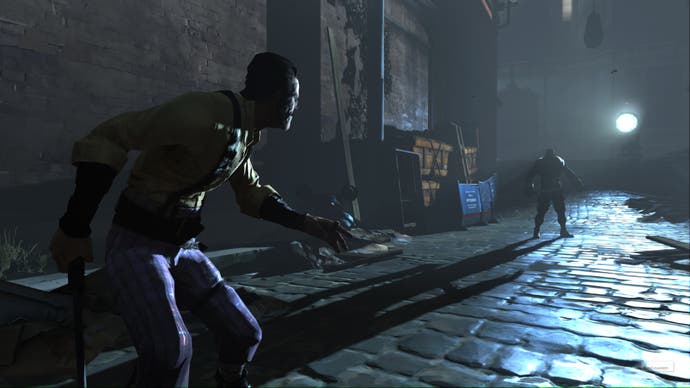
Dishonored looks rough around the edges at the moment. Some scenes, like the arrival of the whaling ship, closely followed by a quick eavesdrop on a pair of guards dumping plague corpses in the sea, are polished and compelling. Others, like the ascent through the lawyer's house with repeated guard chatter and slightly clunky NPC routes, are still getting there.
We also still have much to see – like the progression system through which you accumulate your abilities, based around collecting runes – and much to understand, like Corvo's link to the supernatural world and its role within Dunwall and the surrounding Pandyssian Continent.
But as first impressions go, this is a beguiling one, sumptuously potent. After so often being invited to use our imaginations but only up to a point, it's exciting to see a game that perhaps watched that Would You Kindly moment in Rapture once upon a time and thought: well then, we better let them do what they want from now on.
It's also quite amusing that the level we saw was called Eminent Domain, because part of me did sit there thinking "compulsory purchase".




